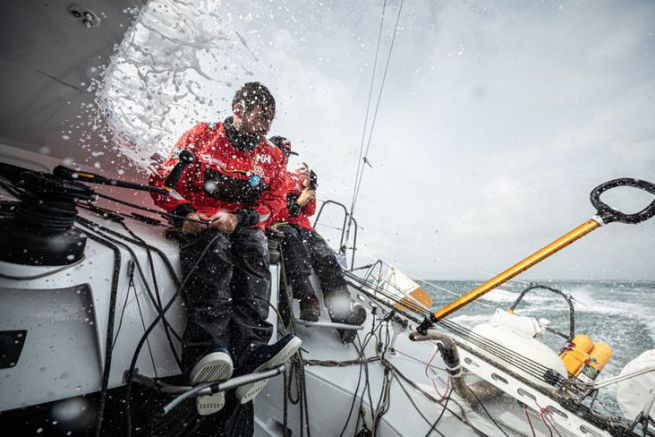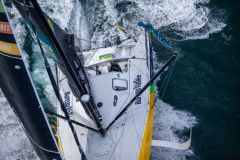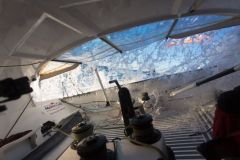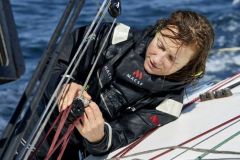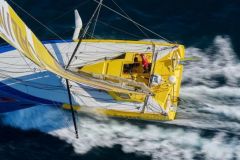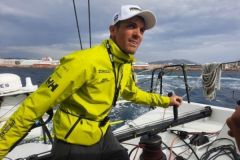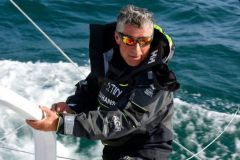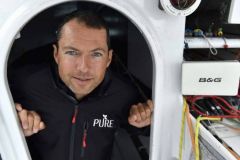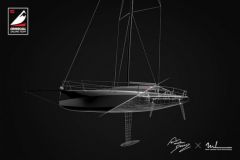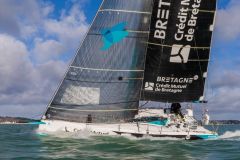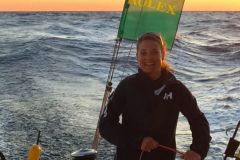In 1982, he was born in Chamonix, at the foot of Mont-Blanc, the man who would later make "skier" and "skipper" rhyme. He began by sliding on the snow, so skillfully that in 2009 and 2011, he won the freeride skiing world championship. Then, it's on the water that he takes off, a bit by chance according to him! But in 2011, he is determined to take part in the Mini Transat. In 2019, he finished 5th in the Transat Jacques Vabre.
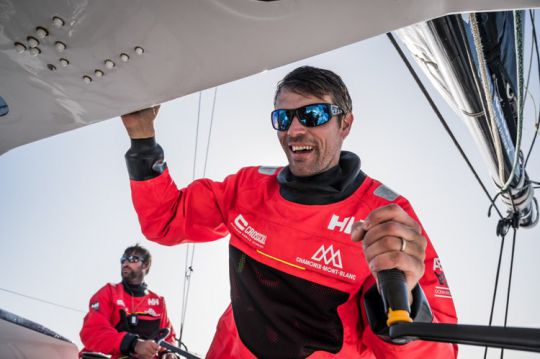
The view
That was during the last Transat Jacques Vabre. We were one day away from the finish. These last 24 hours have seemed quite strange to me, I must say. Contrasting in fact: on the one hand an incredible, great happiness to arrive, to have reached my goal; and on the other, a sort of sincere sadness that it was my last day at sea, that it was indeed finished. At nightfall, when the sailing conditions were easy, the horizon offered me this astonishing vision: not a sunset, no, but a sunrise at sea level! Those of the city all over there, on the edge of a faraway land, which I could not yet make out. It was what is called, it seems to me, "light pollution". The boat was heading straight for that long orange light framed in black. All through that last night, which I remember so vividly, it was like a never-ending sunset in front of me...
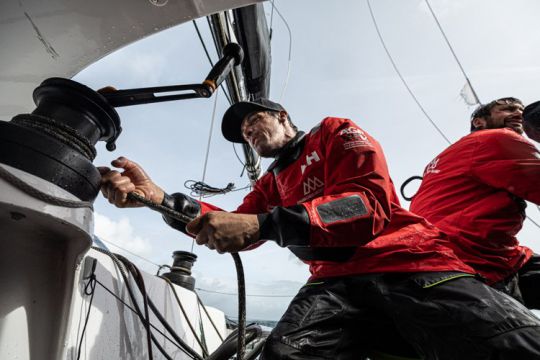
The touch
In 2011, I'd only been sailing for a year, but I'd embarked on the Mini Transat! These small 6.50-metre boats have a special feature: their ends are so thin that it's often difficult to hold them up. Add to that salt and water... and you get ropes that are very damaging to your hands! I also believe that the omnipresence of salt causes a sort of micro-fungi to develop under the skin... In short, after two days of bad weather and rough seas on the way to Madeira, I found I couldn't open and close my hands normally anymore. Complicated in the middle of the race! In short, every time I put pressure on my skin, I had the impression that millions of little nails were sticking into my pulpit. Yes, unpleasant to say the least! That's how I spent three days with really painful hands. And then I had to put on gloves and end up massaging myself with a suitable cream that I hadn't thought it was necessary to use beforehand... It was my first big race: I didn't yet know the particular, and often unique, conditions in which you sail in competition. Everything was so new to me. And I was so focused on performance and my boat that I forgot about myself. In this case, I hadn't protected my hands enough. I learned to take care of myself and my boat, so I didn't have to endure too much during the races!
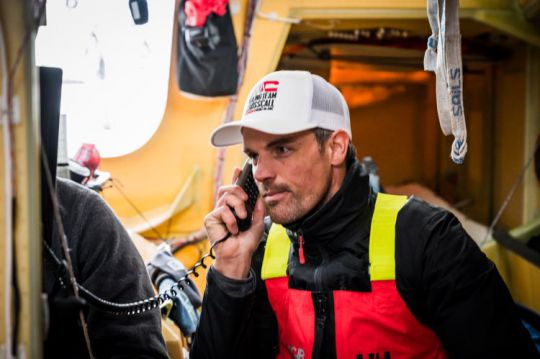
Hearing
It's an insane noise that I remember right away. A noise that I heard in the extreme, in 2017, when I was racing the Transat Jacques Vabre with Romain Attanasio.
A noise so intense... We were leaving the Channel. And after only 48 hours of racing, we were already in the middle of a storm! The sea was stormy, and was hitting our all-carbon boat violently, a real floating sound box... It felt like it was going to smash it, like it was going to collapse! I found it hyper creepy, that's for sure, but also, in the end, hyper reassuring as well, because if this boat was able to withstand that, it was because it was really solid, and would therefore take us all the way to the end! In fact, the rigidity of this type of boat is as impressive as the din of the water on the hull can be... I can think of another noise, a very pleasant one. I can only hear it when the sea is very calm, when the boat slides smoothly. It's the flow, almost like a run-off, of the water along the rudder. With habit, and by concentrating on this fluid sound net, we can estimate the boat's speed: the noise increases, so we accelerate; it becomes more discreet, we decelerate. It's pretty crazy, I find it's possible to convert sound into motion. I love those moments when I listen to my rudder and try to guess how far my whole boat is going, because then I feel like I'm in osmosis with it. Very privileged moments between him and me, that's for sure... I remember one, more precisely: it was during a qualifying race for the Mini Transat, one of my first solo sailings. I'd just returned from Ireland, it was on the passage of the Raz de Sein, renowned for its strong current and its reefs. When I passed through there at the end of the afternoon, the weather was ideal, I was under spinnaker, I was going in the direction of the current precisely... And it was slippery, it was slippery... What fluidity, I remember it well! I felt like I was on a conveyor belt, in the heart of an area which is famous for its complicated sailing conditions. And one which I'd heard about many times in these terms myself. But all I heard then was this very pleasant little noise!
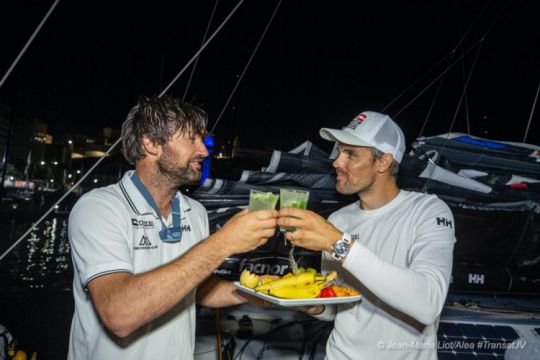
Taste
I've discovered that it's a sense that gives me different sensations when I'm at sea or on land. I never eat lentils when I'm ashore, and I probably wouldn't really like them. Well, in the race, it's the opposite: it's my favourite dish and I keep it for myself for the difficult moments. I don't choose sweet, but salty food to boost my energy! I prepare the dish by salting in advance. This taste, I know that it will do me good, that it will comfort me, in every way. And I taste it. I think the first time I ate it was during the Mini Transat in 2011, when I was at the end of my rope. I can't really figure out why this meaning changes so much. It's true that we have a different relationship to food when we're at sea. Perhaps also that our senses, our feelings being intense at sea, influence our perception of taste? I admit, I can't explain it all very well..
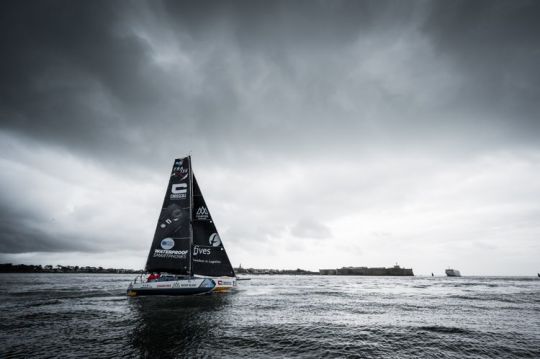
The sense of smell
When I leave the shoreline, I also leave its smells, those related to vegetation, pollution, land, and many others. The further I move away, the more they fade away. Until they disappear. Until they are finally replaced by others, less intense, less numerous, that's for sure: salt, iodine, fish, humidity... That's it. I've estimated that it takes about 48 hours of sailing time to "clean up" the smells from land, after which you can breathe in the sea air. Well... because it's also the one that makes me take to the open sea. If I go out to sea, it's because of this feeling of no longer being submissive, of freedom that passes through all the senses, including the sense of smell, which also has a role to play in this. And then, losing sight, if I may say so, of these smells linked to the land, allows, once the crossing has been made, to find them better!
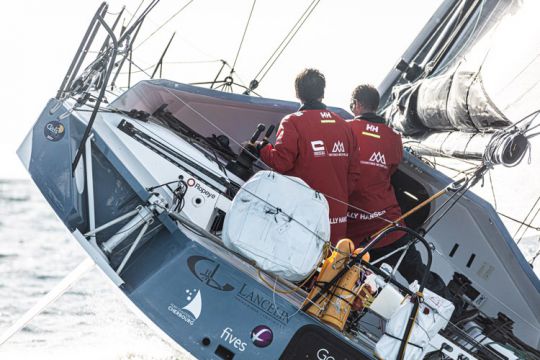
From one slide to the other..
Skiing up the mountain and sailing across the sea is quite different from the point of view of hearing. What we are looking for when we go to the summits is rather the incredible calm that reigns up there. And in the winter, the snow deafens the noises even more. The only noises you can hear are small ones, like a carabiner being closed, for example. At sea, I don't think you really want to find peace and quiet and peace and quiet. From the point of view of smell, on the contrary, I think that sea and mountain are similar. In both cases, you leave the smells, from below as well as from over there, and you find others above and on the water. And if we perceive the latter, which are not, in fact, so intense, it's mainly because they disinhibit us from the former! For the vision, the similarity is also to be underlined between sea and mountain, high mountain, I specify. Because, from the summits, we can see so far away... like on the oceans. And you can also admire a 360° panorama. And often, one is alone, or almost alone, to benefit from this point of view there, at that moment. It's always a rather unique moment. It's not like yet another sunset, even a beautiful one, seen from home, like every night in good weather. As far as touch is concerned, there is of course the cold that can be common. But I also see a real difference. In the mountains, we are more in touch with nature itself. Of course, we use metal and textile materials, but above all we are connected to the earth: we put our hands, feet and knees on rock, ice, snow... We are in direct, tactile contact with nature. At sea too, of course, you are connected to the elements, but there is the boat, which appears as a more artificial interface.
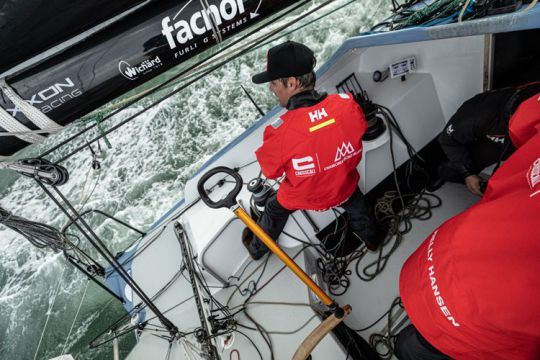
What about fear?
I felt it in my first year, quite folksy you'll understand, of sailing. I then had several qualifying races to do on my 6.50 metre prototype. During one of them, single-handed, I had to tack behind the Coningbeg buoy in the east of Ireland. On the way back, at the end of the afternoon, there was a complete breakdown of the electronics: I no longer have a GPS, no compass, no anemometer, no wind vane, no speedo, no communication tools. For me, who used to refer to these tools a lot, it's not a good time... And as far as my maritime experience is concerned, I'm not too experienced yet! So I'm spending a horrible night asking myself a lot of questions, even moping. I think I was really scared. In fact, I had absolutely no idea how I was going to be able to come back, or for that matter... that's what made me panic, not knowing. And since I'd never thought of this kind of possible breakdown, I hadn't anticipated anything. In the morning, probably a little rested after all, I was better. And as the hours went by, I managed to overcome my anxiety: I got back into the skin of a sailor and regained a certain amount of self-confidence. The benefit of all that is that in just one night and its next day, I've gained five years of experience!
